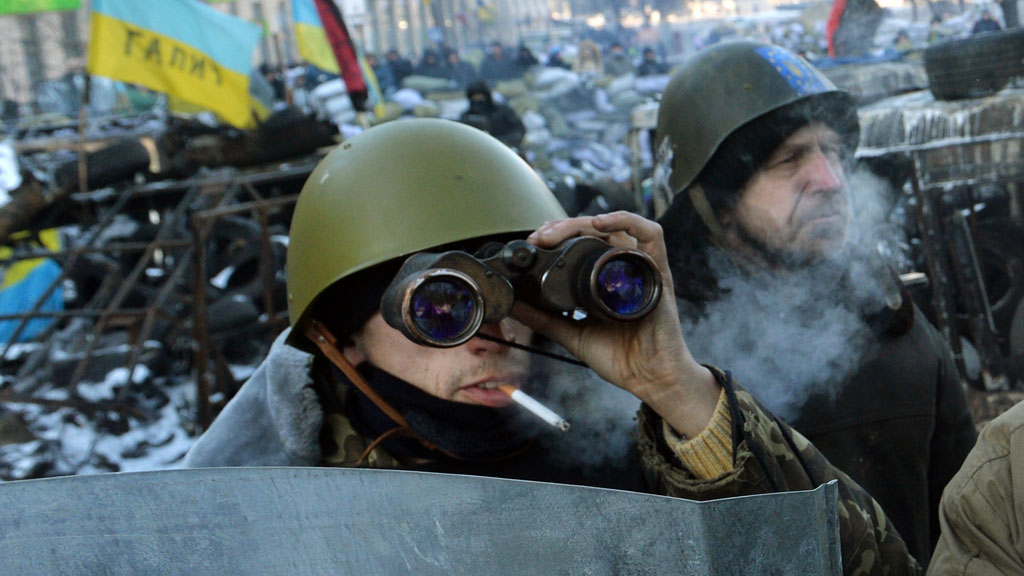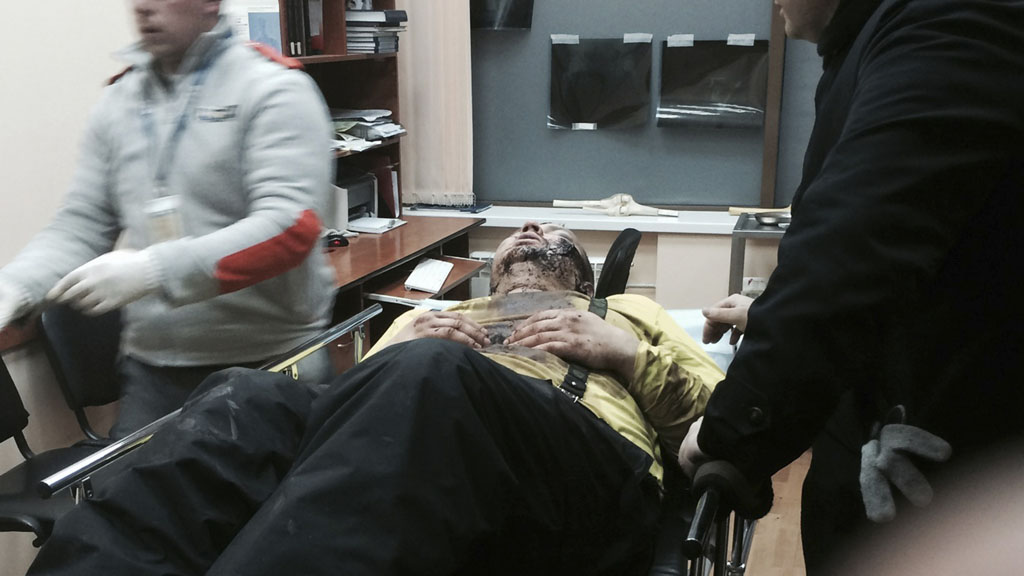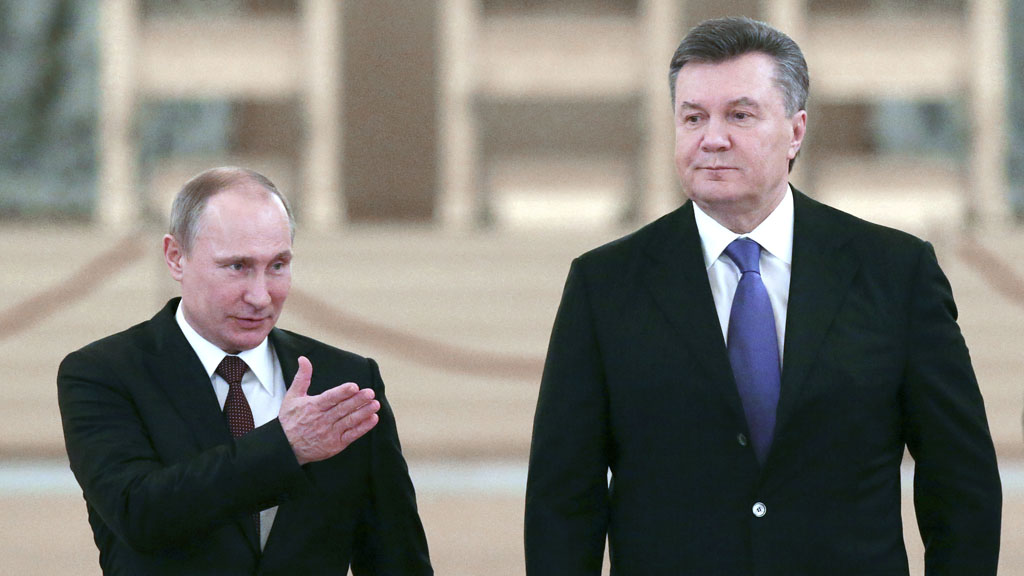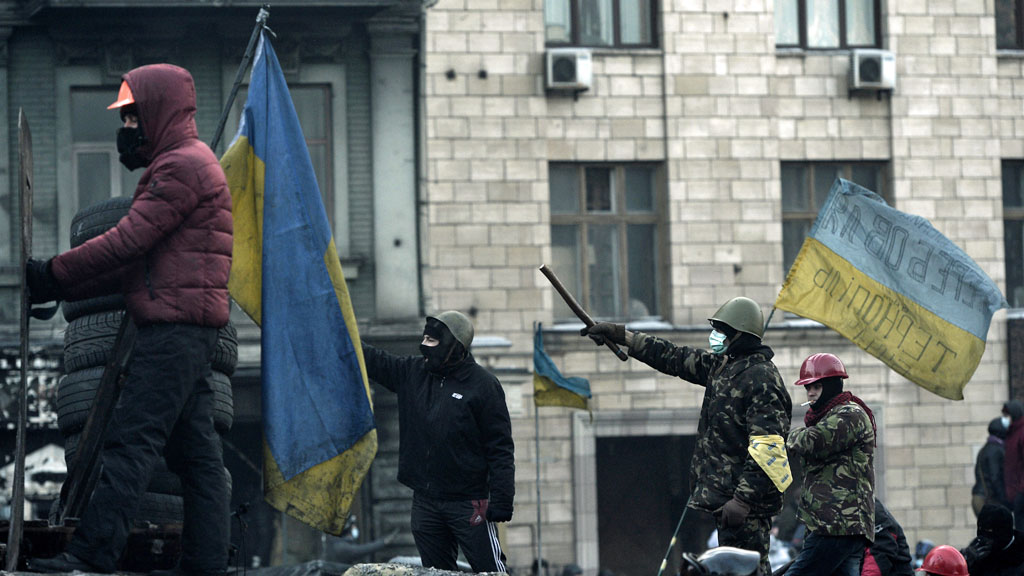Ukraine protesters flee country amid ‘death squads’ claim
Injured activists fly to Lithuania for treatment after reports of people being snatched from hospital beds. An opposition leader says “death squads” are at work in Ukraine.

Arseniy Yatsenyuk, leader of the opposition party Batkivshchyna (“Fatherland”), said recent allegations of murder, abuse, torture and kidnapping were “evidence of the facts that there are now death squads in Ukraine, like in Latin America”.
He spoke after another anti-government activist, Dmytro Bulatov, was found alive but badly beaten after being abducted and tortured by unknown kidnappers.
Local reports said Mr Bulatov, 35, a leading member of the Automaidan protest group, was held captive for more than a week before being dumped in snowy woods near the capital Kiev with serious injuries.
Mr Bulatov said: “I was crucified, I’ve got holes in my hands. A part of my ear was cut off. They cut my face. There is not a spot on my body that hasn’t been beaten.
“I couldn’t tell who they were, as it was always dark where they kept me, but their accent was Russian.”

Pictures of Mr Bulatov covered in blood were widely broadcast on Friday in a graphic illustration of how the struggle for the former Soviet state’s future continues to descend into extreme violence.
Earlier this month activists Yuri Verbitsky and Igor Lutsenko were abducted from a hospital in Kiev by unknown men. Lutsenko was beaten up but released, while Verbitsky, 50, was found dead in woods near the capital.
Flown to hospitals abroad
News of abductions from hospital beds has led to some activists injured in clashes with riot police and government refusing treatment in local hospitals.
Lithuania has offered medical treatment to two Ukrainians and eight more are expected to be flown to the country in the coming days.
A spokesman for Lithuania's foreign ministry told Channel 4 News:
"Following the recommendations of physicians and in cooperation with Ukraine’s non-governmental organizations, ten Ukrainians who need most help have been selected. The first patient – a young Automaidan activist - arrived on 29 January. He was heavily beaten in Kiev, when he and his friends were stopped and assaulted in the street by Berkut Police.
"The second Ukrainian, who has lost an eye at Maidan due to fragments, arrived on 30 January. They are undergoing treatment in Vilnius and Kaunas Clinics. Their medical treatment is financed by the Lithuanian government.
"Employees of the Embassy of Lithuania in Ukraine used personal resources to fund the travel expenses of the two patients to show solidarity with the injured Ukrainian people.
"The remaining eight will arrive shortly, depending on their health condition and the recommendations of their physicians."
The Baltic country has the EU presidency and played a leading role in negotiations with Ukraine’s beleaguered president Viktor Yanukovych over closer trade links with Europe.
Lithuania’s president Dalia Grybauskaite visited a 23-year-old Ukrainian who was airlifted to the Lithuanian capital Vilnius with serious chest and lung injuries.
Mr Bulatov is being treated for his injuries in a private hospital in Ukraine.
International human rights organisations have called for investigations into allegation of kidnappings, torture and deaths in Ukraine.
On Friday UN spokesman Rupert Colville said: “We are appalled by the deaths reported in recent days in Kiev, which should be promptly, thoroughly and independently investigated. We are also calling for an investigation into reports of kidnappings and torture.”

Sick leave
President Viktor Yanukovich went on sick leave on Thursday, claiming to be suffering from a high fever and acute respiratory illness.
The 63-year-old signed into law an amnesty for demonstrators detained during the mass unrest of recent months, and repealed anti-protest legislation in a gesture of compromise.
But many protesters have rejected the offer, which is conditional on activists leaving occupied government buildings.
The crisis began in November when the president’s decision to take a $15bn loan from Russia instead of signing a deal promising closer economic co-operation with the EU prompted mass protests.

Wider conflict?
Although the mass protests drew support from many sections of Ukrainian society, some anti-government elements have become increasingly violent in recent weeks.
A radical nationalist paramilitary group called Right Sector, blamed for violent clashes with police in Kiev, has demanded the release of activists detained by police and threatened to take the law into their own hands to free their comrades.
The group says it wants to be involved in negotiations between the government and other opposition groups.
Protesters in military uniforms and gas masks are manning roadblocks in central Kiev in defiance of riot police. On Friday, Ukraine’s military called on Mr Yanukovych to take “urgent steps” to ease the turmoil.
Some international observers believe that the unrest has the potential to descend into a wider civil conflict right on the borders of the EU, with the potential for Ukraine’s Soviet-era master Russia to become involved.
Dr Olga Onuch from Oxford University told Channel 4 News: “There are three potential scenarios. One is the one that most observers would like. The violence stops. There is an election and a return to the laws of the country. Ukraine moves out of the mess through institutional democratic process. This is the most optimistic scenario.
“There is an option that nothing will change, that things continue to stagnate. It doesn’t turn to violent chaos and we are in a position a year from now where there are presidential elections.
“The other options are that the regime pushes back with violence, or that more people across the country get involved in direct action or violent actions. That option would leave me to believe there is potential for a civil conflict on the edge of the EU.
“Potential migration flows from Ukraine to the EU. This is far and away the worst option. If you had asked me in November I would never think that would be an option. It could also mean Russia could get engaged.”